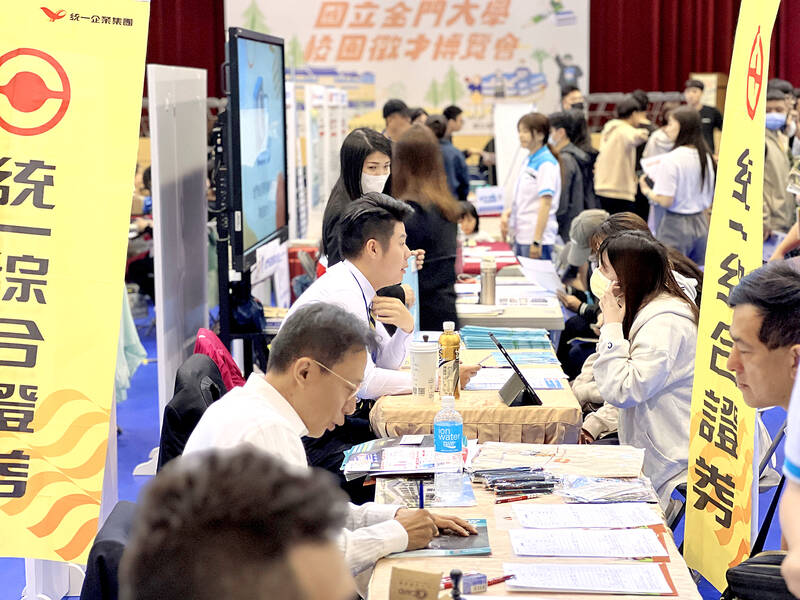Hiring activity in Taiwan would pick up by double percentage points next quarter, as healthcare, transportation and logistics, as well as industrial material sectors are recruiting staff to meet business needs, a survey by ManpowerGroup, which was released on Tuesday, showed.
The human resources advisory firm’s quarterly employment outlook index indicated there would be an 18 percent increase in hirings in the next three months, as 39 percent of companies voiced plans to hire more workers, while 21 percent intend to reduce staff, and 39 percent would not make any changes, according to the survey.
The survey collected responses from 630 Taiwanese companies.

Photo: Wu Cheng-ting, Taipei Times
Firms at healthcare and life sciences sectors showed the strongest recruitment intention at 43 percent, followed by transport, logistics and automotive sectors at 41 percent, and industrial and material industry at 31 percent, it said.
Lai Yi-wen (賴怡文), managing partner of the professional talent business at ManpowerGroup, said the findings came as little surprise, since the world assigns more importance to healthcare following the COVID-19 pandemic.
The trend explained why workforce demand at healthcare and life sciences sectors spiked 23 percent from three months earlier, Lai said.
Medical facilities generally adopt a proactive approach in developing smart healthcare systens and drugstore chains move to expand their scale, Lai added.
High turnover among frontline workers also contributed to tight demand and employers have to take action beforehand to prevent workforce shortages, the survey showed.
Taiwan’s aging population is driving up workforce demand at long-term care and chronic disease management facilities, ManpowerGroup said, adding that medical institutions have been recruiting professionals.
At the same time, these sectors have made efforts to hire workers with digital solution capabilities in the belief that digital transformation would play an important role in the future of healthcare, it said.
Human recruitment remains active at transport, logistics and automotive sectors — though a bit subdued from the preceding quarter — as demand for domestic and cross-border tourism stays resilient, ManpowerGroup said.
Operators are looking to speed up digital transformation, improve the working environment, battle a persistent lack of workforce and boost operational efficiency, it said.
The latest employment outlook suggests a 20 percent gain from the previous quarter for industrial and materials sectors, it said.
Lai attributed the recruitment need to the government’s social housing projects, as well as local technology and manufacturing firms building plants in Taiwan and overseas.
Additionally, reconstruction works related to the April 3 earthquake in Hualien would create 1,000 job opportunities, Lai said.
People with prior experience in clean room, electronics, mechanics, refrigeration and air-conditioning would be keenly sought after, Lai said.

When an apartment comes up for rent in Germany’s big cities, hundreds of prospective tenants often queue down the street to view it, but the acute shortage of affordable housing is getting scant attention ahead of today’s snap general election. “Housing is one of the main problems for people, but nobody talks about it, nobody takes it seriously,” said Andreas Ibel, president of Build Europe, an association representing housing developers. Migration and the sluggish economy top the list of voters’ concerns, but analysts say housing policy fails to break through as returns on investment take time to register, making the

EARLY TALKS: Measures under consideration include convincing allies to match US curbs, further restricting exports of AI chips or GPUs, and blocking Chinese investments US President Donald Trump’s administration is sketching out tougher versions of US semiconductor curbs and pressuring key allies to escalate their restrictions on China’s chip industry, an early indication the new US president plans to expand efforts that began under former US president Joe Biden to limit Beijing’s technological prowess. Trump officials recently met with their Japanese and Dutch counterparts about restricting Tokyo Electron Ltd and ASML Holding NV engineers from maintaining semiconductor gear in China, people familiar with the matter said. The aim, which was also a priority for Biden, is to see key allies match China curbs the US

NOT TO WORRY: Some people are concerned funds might continue moving out of the country, but the central bank said financial account outflows are not unusual in Taiwan Taiwan’s outbound investments hit a new high last year due to investments made by contract chipmaker Taiwan Semiconductor Manufacturing Co (TSMC, 台積電) and other major manufacturers to boost global expansion, the central bank said on Thursday. The net increase in outbound investments last year reached a record US$21.05 billion, while the net increase in outbound investments by Taiwanese residents reached a record US$31.98 billion, central bank data showed. Chen Fei-wen (陳斐紋), deputy director of the central bank’s Department of Economic Research, said the increase was largely due to TSMC’s efforts to expand production in the US and Japan. Investments by Vanguard International

STRUGGLING TO SURVIVE: The group is proposing a consortium of investors, with Tesla as the largest backer, and possibly a minority investment by Hon Hai Precision Nissan Motor Co shares jumped after the Financial Times reported that a high-level Japanese group has drawn up plans to seek investment from Elon Musk’s Tesla Inc to aid the struggling automaker. The group believes the electric vehicle (EV) maker is interested in acquiring Nissan’s plants in the US, the newspaper reported, citing people it did not identify. The proposal envisions a consortium of investors, with Tesla as the largest backer, but also includes the possibility of a minority investment by Hon Hai Precision Industry Co (鴻海精密) to prevent a full takeover by the Apple supplier, the report said. The group is